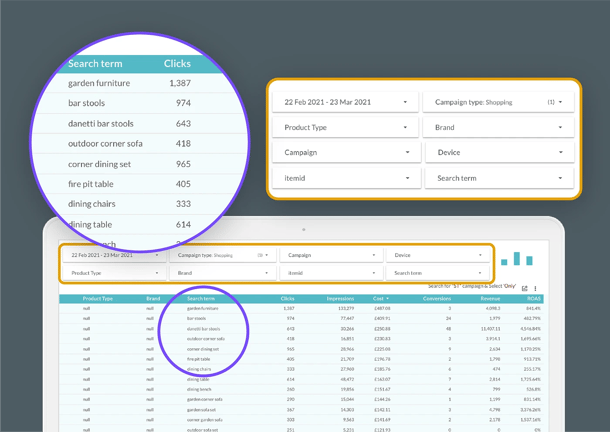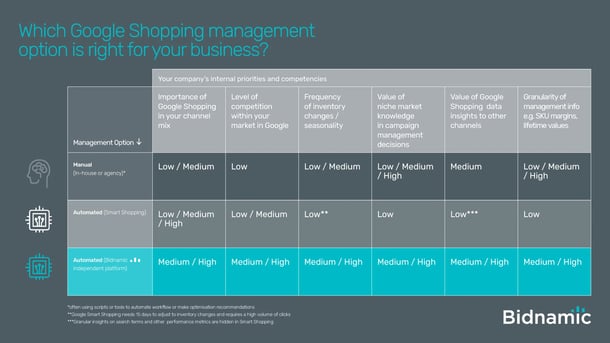Updated on January 28, 2026 | 9 minute read | Olivia MacCunn
Home > Resources > Using a PPC agency to manage your Google Shopping campaigns
Contents
Google Shopping and PPC Marketing
How to manage your Google Shopping campaigns
How do agencies manage Google Shopping?
Scripts, spreadsheets, and third-party tools
PPC agencies and Google Smart Shopping
Google Shopping agency fees
Should I be using a Google Shopping or PPC agency?
Which Google Shopping campaign management option is right for your business?
Additional resources
Since its launch, Google Shopping’s image-based product listings have proved highly attractive to consumers. It has become one of the main sources for new customer acquisition for retailers: data from Bidnamic’s platform shows that by 2020 Google Shopping’s share of retail paid search clicks had reached 65%.
Managing Google Shopping campaigns can be complex and time-consuming, and a good PPC agency, or specialist Google Shopping agency, can really add value to some campaigns.
Bidnamic has experience of working with many agencies with some great results, like LuxDeco and their agency Reload Digital.
PPC includes paid search and paid media. Within paid search, there are two options: text ads, which were launched in the 1990s, and Google Shopping, which was introduced in the late 2010s.
Discover more about PPC campaigns in digital marketing
Unlike text ads, where eight or more adverts are displayed in multiple search engine results pages (SERPs), in Shopping only the top five top spots are displayed for each individual search made. Retailers must bid for their product to appear in these top spots and must pay their bid towards Google when a user clicks their ad – even if the shopper instantly bounces, or does not complete a transaction.
Whilst paid Google Shopping results are displayed in the main SERP, organic (free) results can be found in the Shopping tab. However, 96% of Google Shopping activity takes place in the main carousel, which appears above text ads and organic results under the general Google SERP.
The limited number of spots in the Google Shopping carousel, combined with their effectiveness, has led to fierce competition, and in some industries, the results are dominated by large budget advertisers like Amazon and Nike.
There are two main options for managing Google Shopping campaigns, each with its own set of benefits and drawbacks. For retailers new to Google Ads, perhaps with a lower number of products, using your in-house team to manage campaigns may be the most efficient and cheapest way to oversee Google Shopping.
However, for larger campaigns, or campaigns that begin to scale, Google Shopping campaign management can quickly become too complex and time-consuming.
In response to this need digital agencies and specialist PPC agencies often include Google Shopping ads management in their range of services.
An agency will have a number of account managers, each responsible for one or more client. A specialist PPC agency will have accredited specialists working on your Google Shopping campaign. Whilst their niche specialism might help drive performance in Google Shopping, specialisation risks a siloed approach where cross-channel campaigns are not aligned, insights and data is not shared, and performance is negatively impacted.
Only the largest full-service digital agencies will have any real expertise in every digital channel. Most will have account managers with a broad range of experience but lacking depth of expertise in any one channel. As a result, your campaigns might be managed more consistently across different channels, but you risk being outperformed in each channel by competitors with more specialist expertise or bigger budgets. This presents a particular problem for Google Shopping due to the limited number of spots on the carousel.
What's more, some retailers have difficulty accessing their performance data at all, finding their agency 'owns' their data. This means if you want to understand how your campaigns are performing, you have to request this data from your PPC provider. Without access to their own data, many retailers feel the numbers they receive may not be entirely accurate and honest.
Depending on the number and size of the accounts they manage, the time that PPC agency account managers spend on your account will be tightly controlled. To introduce efficiencies, many PPC agencies use technology to manage large volumes of data.
Many PPC agencies use workflow tools to save time and introduce efficiencies into the account management process. Often these are spreadsheet-based scripts to automate reporting, generate optimisation suggestions, and facilitate bulk uploads.
Many scripts or tools are used to identify opportunities for optimising campaigns. These opportunities then need to be analysed, hopefully by a Google Shopping expert, and the best of them implemented manually using some form of block bidding.
Scripts can be a great option for retailers with few SKUs, as they work well with a limited number of rules. However, when your inventory grows and you struggle to maintain your growth or ROAS targets, scripts become overcomplicated, they cannot compute with multiple rules simultaneously, and rules end up being overridden or completely bypassed.
Google has retired Smart Shopping campaigns and has replaced them with Performance Max campaigns. Get up-to-date information on Performance Max campaigns.
The next step up on the technology ladder is Google’s entry-level automated bidding platform, called Smart Shopping. Some agencies rely on Smart Shopping to manage their clients’ campaigns.
Smart Shopping is easy to use. It’s quick to set up, has a limited number of configuration variables, and once it’s set up it makes all the bidding decisions for you – no further intervention is needed. And it’s free of charge.
Smart Shopping has its advantages – mainly to smaller retailers, or those with limited competition – but multiple drawbacks, the main one being the ‘black box’ nature of the platform which removes access to valuable campaign data, like the data taken from Bidnamic’s dashboard in the image below. We cover the pros and cons of Smart Shopping in more detail.
..
Despite the lack of access to search data, many PPC agencies like to use Smart Shopping because it is time-efficient, and Google’s agency account managers like to position it as the state-of-the-art solution for Google Shopping. Which it isn’t.
Google Shopping agency fees, like PPC agency fees, are based either on a percentage of advertising spend or a flat monthly fee based on an estimate of the time needed to manage the account effectively. Or a combination of the two.
Percentage fees can vary from 5% to 15%, depending on the agency and the size of the account. Sometimes a sliding scale is applied. Linking the fee to the size of the advertising spend is logical, so the argument goes, because the higher the spend the more time is needed to set up and manage the campaigns.
The drawback of a fee based on the percentage of spend is that there is an inherent conflict of interest: a well-managed campaign might result in a reduction in spend, which would be a disincentive for an agency.
A flat monthly fee, or retainer, can be a better option. As the account grows in size and complexity, the fee can be renegotiated to take that into account. It also means that agencies will not be penalised for introducing efficiencies, such as reducing the CPC and reducing the spend.
It does mean however that agencies will need to have good account management processes to avoid conflict: from the client’s perspective, there’s nothing worse than an agency needing a new purchase order before agreeing to an impromptu phone call or meeting because all the account management time has been used up that month.
Conversely agencies that habitually over-invest in clients either go bust or end up having to have difficult renegotiations part way through a contract.
We have plenty of experience working with great Google Shopping agencies that use both percentage fee and flat fee models. In our experience, what matters most is the quality of the agency staff and a healthy level of self-awareness of their level of expertise in Google Shopping.
We also know that automated platforms work best when combined with human expertise. We have a team of Google Shopping experts, many of them ex-Google, with an understanding of how Google Shopping works that is second to none. They also have deep experience in multiple ecommerce sectors and can benchmark your performance against retailers in the same industry.
From our experience, however, the most valuable insights come from the people with the most intimate knowledge of the company’s products, markets, and competitors. And we have regular meetings with our clients – or their PPC agencies – to ensure that this knowledge is applied to campaigns to ensure the best results.
This way, our data analysts and experts can share the granular insights generated from our clients’ Google Shopping campaigns, insights that can be used to optimise campaigns in other channels, such as Amazon, or Google remarketing campaigns.

Agencies can provide a personalised service and take the pains of bid management off your shoulders. However, your business may need optimisation at a more granular level, and a level of analysis for each variable in your catalogue that humans cannot achieve.
If you’re looking to achieve a greater target ROAS while cutting back on your CPCs, it may be worth booking a consultation with one of our Google Shopping specialists. We’re not for everyone, so book a demo with us to see if our advanced automated bidding platform is right for your clients or your business.
Find out more about how our experts can help optimise and manage your Google Shopping campaigns.
Combining Bidnamic’s machine learning platform with the expertise of a PPC agency.
Discover advanced technologies for conversion rate optimisation
Read more about the pros and cons of Google Smart Shopping.
How Smart Shopping measures up against Bidnamic’s advanced machine learning platform.

